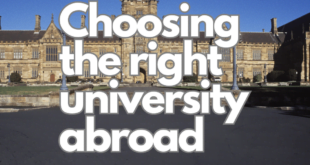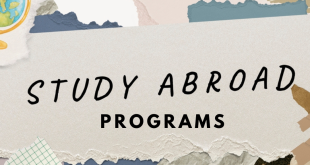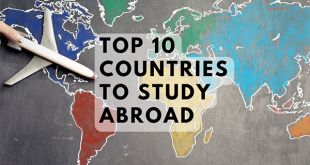Embarking on a journey to pursue higher education in a foreign country is an exciting and transformative experience. For countless international students, navigating the intricacies of obtaining a student visa is a pivotal step. In this comprehensive guide, we delve into the key aspects of the international student visa process, demystifying the steps and requirements that shape the path for students from around the globe. From understanding different visa types to decoding the application procedures and essential documentation, our aim is to empower prospective students with the knowledge and insights needed to successfully go through this crucial phase. Whether you’re aspiring to study in the United States or any other destination, this guide aims to serve as a valuable resource. The journey begins here – let’s unravel the mysteries of the international student visa process together.
Table of Contents
Choosing the Right Type of Visa: What is the Best Visa for International Students?
Determining the most suitable visa is the initial step. Student visas and exchange program visas are the primary options, each catering to different study abroad scenarios. Thoroughly research into the visa categories available will ensure that you select the correct one aligned with your academic pursuits.
For example, if you want to pursue studies in the USA, you have the choice between a F1 Visa for long term studies and a J1 Visa for exchange programs. On the other hand, to study in Europe, especially if you plan to travel in the Schengen area, the regulations are almost the same everywhere. Firstly, you apply for a long term visa for study purpose that you exchange for a resident permit once you set foot in your country of choice. If your study program lasts less than 90 days, a short-term visa is enough.
Meeting the Student Visa Requirements
A meticulous document preparation is the cornerstone of a successful student visa application.
General vs Specific Country Visa Requirements
Every visa application mandates fundamental documents. This generally includes a valid passport and passport-sized photos. Additionally, a letter of acceptance from the educational institution is a common requirement.
Countries, however, may have unique criteria for student visas. This ranges from variances in documentation to language proficiency tests. Do an in-depth research on the host country’s visa regulations is crucial.
Common Documents to Provide
To kick off your journey, it’s crucial to gather the necessary documents for your visa application. These typically include:
- Letter of acceptance from a university: Your official acceptance letter from the educational institution you plan to attend.
- Financial documentation: Demonstrating your ability to cover tuition and living expenses. Bank statements, scholarship award letters, or affidavits of support are commonly accepted as evidence of financial stability.
- Valid passport: Ensure your passport is valid for the entire duration of your intended stay.
- Completed visa application form: Fill out all required fields accurately.
- Passport-sized photos: Comply with the specifications outlined by the consulate.
Gathering Necessary Documents
To do so, compile a comprehensive checklist, including educational transcripts and financial statements. Proper document preparation and verification reduce the likelihood of application complications.
Attention to detail is key. Ensure all documents are accurate, up-to-date. Also, meet the specific requirements outlined by the embassy or consulate, such as translating some documents if necessary.
From financial statements to acceptance letters, we provide you with detailed guides with the specificity for each country. Whether you want to study in the US, in the UK, in Italy, in Japan or anywhere else, you’ll find a comprehensive guide that will help you ensure your application package is comprehensive and compelling.
Understanding Application Timelines
Timing is crucial in the visa application process. Being aware of key timelines will enable you to submit your application with precision.
Start your visa application well in advance to avoid last-minute stress. The timeline generally involves the following steps:
- Upon acceptance: Initiate the visa process as soon as you receive your acceptance letter.
- Financial planning: Arrange funds and prepare financial documents.
- Visa application submission: Submit your application ahead of the recommended deadline.
Moreover, be aware of any unique requirements tied to the academic calendar. Keep in mind that different semesters may have distinct visa application procedures.
Submit your visa application well within the stipulated timeframe. Late submissions may result in processing delays or, in some cases, the rejection of your application.
Lastly, be proactive! To ensure a hassle-free experience:
- Stay informed: Regularly check for updates on visa policies and requirements.
- Schedule consulate appointments early to secure your preferred dates.
- Double-check all documents before submitting them, for completeness and accuracy.
Completing the Visa Application Form
Understanding the nuances of the visa application form is crucial. Be mindful of whether the application is online or paper-based. Moreover, make sure you provide accurate information. Any discrepancies in the application form can lead to complications during the review process.
Additionally, it’s essential to carefully read and follow the instructions provided with the application form. Each section may require specific details, such as personal information, educational background, and financial resources. Double-checking the accuracy of these details ensures that your application is not only complete, but also reflects your true circumstances.
When filling out the form, pay special attention to dates and signatures. Ensure that all dates are entered correctly, and signatures are placed where required. Mistakes in these areas could result in the rejection or delay of your application.
Preparing the Visa Interview
The visa interview is a pivotal step in the application process. It provides an opportunity to demonstrate genuine intent and address any concerns the visa officer may have.
Anticipate questions about your study plans, ties to your home country, and your ability to finance your education. Craft thoughtful responses that showcase your commitment and preparedness. Confidence and preparation are the keys to success.
Visa Interview Questions For Students
Some countries require a visa interview. Practice common interview questions, and be prepared to articulate your study plans and reasons for choosing their country. Here are some examples of interview questions you need to prepare.
Why do you want to study in [country]?
Mention your belief in the country’s high-quality education and excellent academic opportunities. And the fact that the country has renowned universities and research institutions in your field of study.
Which university/college have you been admitted to, and what program will you pursue?
Answer simply to this question, emphasizing on the thorough research you’ve made to choose an institution, and the reasons why you opted for that specific institution (strong reputation, relevant program, etc.)
How did you choose this particular university/college?
Prepare a list of the factors you’ve considered when choosing this institution. This includes: academic reputation, faculty expertise, program offerings and research opportunities and of course the alignment with your academic and career goals.
What are your plans after completing your studies?
Since a student visa is a non-immigration visa, avoid hinting to the questioner about your wish to remain in the country after your studies. Instead, highlight your plan to return to your home country and apply the knowledge and skills you have gained to contribute to its development. Also, demonstrate you have strong ties to your home country which serve as evidence of your intention to return after completing your studies.
How will you finance your education and living expenses?
Here’s where you talk about scholarships or sponsorships or any personal fund that you have in hand to finance your tuition and living expenses. Insist on the fact that you have a clear understanding of these cost details and that the bank statement you have provided proves a sufficient fund available.
Do you have any relatives or friends in the country you are planning to study in?
Yes/No. If yes, provide details. If no, mention that you do not have any immediate relatives or friends in the country but are excited to make new connections and immerse yourself in the local culture.
Can you explain your academic background and how it relates to your chosen field of study?
Explain here all the degrees you have completed and how each one of them provided you a foundation for the subject you plan to study. Moreover, highlight any previous studies that have inspired you to pursue further education in your field of choice.
How did you select your chosen field of study?
Discuss the factors that influenced your decision to choose your field of study. Mention any personal experiences, passions, or career aspirations that led you to this particular field. Emphasize how it aligns with your long-term goals and how further education in this field will contribute to your professional development.
What are your future career plans?
Share your vision for your future career and how your chosen field of study will help you achieve your goals. Discuss potential job opportunities, industries, or research areas that you are interested in exploring after completing your studies. Insist on how your education abroad will enhance your career prospects.
Why should you be given a student visa?
Last but not least, it’s time to put forward a strong case on why you can obtain a student visa. When answering this question, make sure to show confidence. And again, make sure to convince the questioner, don’t get the impression that you have plans to remain in the country and plan to return to your home country after completion of your studies.
Handling Visa Denials
The process to obtaining a student visa can be challenging, and a visa denial can be disheartening. However, understanding the common reasons for rejection and taking proactive steps in response is crucial to a successful reapplication process.
Common reasons for visa rejections
Visa denials can occur for various reasons, including incomplete documentation and a lack of proof of ties to your home country. Understanding these common pitfalls is crucial.
Incomplete Documentation
To avoid this issue, ensure all required documents are submitted accurately and completely. Moreover, double-check that your financial statements, academic transcripts, and any supporting materials meet the specified criteria.
Insufficient Proof of Ties
Establish a clear connection to your home country by highlighting family ties, employment prospects, or other commitments. Also, provide compelling evidence of your intent to return after completing your studies.
Steps after a visa denial
If your visa is denied, take proactive steps to address the issues and enhance your reapplication.
Re-evaluate Documentation
- Conduct a thorough review of your visa application documents.
- Identify any deficiencies and correct them to strengthen your case.
Seek Guidance from the Educational Institution
- Consult with the international student office at your educational institution.
- Request their assistance in understanding the reasons for denial and guidance on improving your application.
Consider an Appeal
If the option is available, consider appealing the decision. Moreover, work closely with the institution or seek legal advice to understand the appeal process and enhance your chances of success.
Address Specific Concerns
If reasons for denial are provided, address them directly in your reapplication. Provide additional information or clarification to alleviate any concerns raised during the initial review.
Check also here our guide on how to handle your Canadian student visa denial. Read here also why your visa to the UK might be rejected and how to reapply.
Visa Approval and Arrival
After visa approval, focus on practical arrangements such as securing accommodation and establishing local support networks to facilitate a smooth transition upon arrival. Connecting with fellow students, alumni, or local communities can provide invaluable support and guidance as you navigate your new academic environment.
The journey doesn’t end with visa approval; arriving in a new country brings its own set of challenges. Check out our practical tips for a smooth arrival and insights into cultural adjustment, ensuring a positive start to your academic adventure.
Extending Your Student Visa
Student visa extension possibilities depend on various factors such as academic progress, financial stability, and adherence to visa regulations. Typically, students may be eligible for visa extensions if they need additional time to complete their academic programs or pursue further studies.
To apply for an extension, students are often required to demonstrate a valid reason. This can be the need for additional coursework, research, or a change in their academic plans. Financial viability is crucial, as authorities may assess whether the student can support themselves financially during the extended period.
Compliance with visa regulations, including attendance and maintaining good academic standing, is also essential. It’s advisable for students to initiate the extension process well in advance of their current visa’s expiration and to carefully follow the specific guidelines provided by the immigration authorities in the host country.
Consulting with the designated school official or an immigration advisor can also be beneficial in navigating the student visa extension process successfully.
Conclusion
In conclusion, the student visa process may seem daunting, but with careful planning and adherence to guidelines, it becomes a manageable journey. By diligently researching visa types, compiling essential documents, adhering to timelines, and following our tips for a smooth experience, you can enhance your chances of a successful visa approval.
Now armed with this comprehensive guide, you are better prepared to navigate the intricate steps involved. Despite the challenges, the rewards of studying abroad are immeasurable. So, embrace the journey, stay resilient, and open yourself to a world of opportunities academically and personally. Good luck on your academic journey abroad!




 Aljawaz Your guide to study abroad
Aljawaz Your guide to study abroad
















